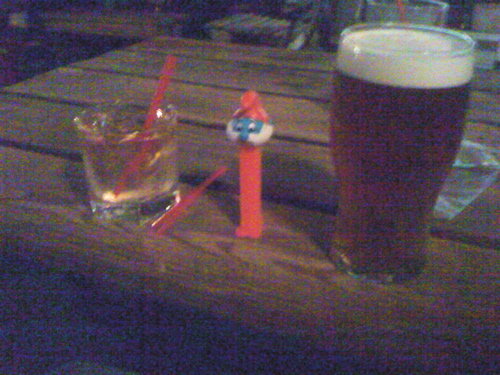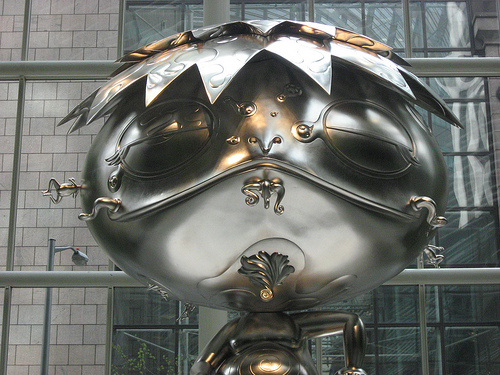You mind if I get a bit personal this week? I don’t know how to talk about Buddhist precepts and practice without it, so I’m gonna.
For me, the last year and a half have been, well, hard. It’s been an in-your-face, deep-tissue massage of my samsaric tendencies. If you need a starting point (of course all true stories are beginningless), I’d trace it to September 2007, when my book was released and the I.D. Project simultaneously became a bonafide nonprofit organization that I was…gulp…the founder of, and therefore, responsible for. Working organizationally with lots of different folks, teaching with lots of different folks is fulfilling beyond comprehension, but also draining in ways I am only beginning to understand. Sometimes life feels like I have a drinking straw in every single pore of skin, and reality is sipping me like a smoothie.
It was also a year-and-a-half of travel, of lots of time in airports, bus and train stations spent contemplating 84,000 versions of the question “Is this IT?” Airports are the best place in the world to fully experience loneliness as a truly embodied event, and bus stations seem tailor-made to consider the four noble truths while sitting in front of grimy Dunkin’ Donuts outlets.
It was funny in planning to write this post, btw, that a mistaken thread appeared last week congratulating me for getting married, since a year and a half ago I was pretty sure I was getting married, and I was pretty sure it was to the ideal lady for me (sorry Jerry Kolber, I only cuddle with boys). That Ideal situation–in the words of Chinua Achebe–fell apart. Then more recently I met another lady who I thought (think) was (is) pretty awesome, too. You know, that hitch-yer-wagons-and-make-a-baby-type-of-awesome. That One–In the words of the Roots–fell apart as well. Evaporated, actually. Disappeared like a Houdini act (are magicians Buddhist teachers?). And now I’m waiting oh so patiently, for the next thing to come together and then –in the words of Pema Chodron–to…um…fall apart. At a Shambhala dharma talk last week, my good friend Joe Mauricio said the heart operates like any other muscle. If you want it to grow, you need to keep tearing it.
The good news is that, as I close in on my 31st birthday, I’m pretty sure I’m a real grown up now. A real Buddhist grown up. Don’t worry: being a grown up doesn’t entail any claims of spiritual attainment. I mean my intention has grown up. A lot. I really see that there is NO escape from the present moment, and the practice of coming back to reality is truly a 24/7/365 endeavor. 24/7/365 is the only way to play this dharma game, boys and girls. Sitting might be 10 minutes a day, practice ain’t. It’s a continuously humbling–and confidence-building–endeavor. So I truly want to make it harder for myself to escape (the addition of weekly therapy has also been tremendously helpful here). I would love to make it IMPOSSIBLE for myself to escape the present moment, but that is itself impossible. If there were no detours, there’d be no path.
This is where the practitioner’s discipline and precept about not using intoxicants as an avoidance tactic–universal to all Buddhist practice–comes in. As the pain of being a grown-up set in over the last year and a half, I noticed myself drinking a bit more than I have before. This is not to say that I became alcoholic, but I definitely saw a few more bottoms of Jameson’s on the rocks and Old Speckled Hens over that time. I think my friends would say I’m generally a happy drunk, but that’s not really the point here.

Let me say this: I have always felt that focusing inordinate attention on ALCOHOL as the intoxicant in question is a misinterpretation of the practice. A dangerous oversimplification of discipline. Let’s face it, anything you ingest or absorb into your body is a mind-altering substance. The Oscars are an intoxicant (quite a popular one). High Fructose Corn Syrup, Nicotine, Caffeine, and iPhone applications are all intoxicants (HFCS might be the worst of all–for your body and the planetary body). Some meditators seem, for some reason, to single out alcohol as THE ONE to reject and refrain from. I never understood why, but then again I never quite understood why we’d look to texts from a different world era to understand contemporary culture. Buddhist practice is not ultimately about the object, it’s about working with the subject, THE MIND. Focusing too much attention on the object means working at a more surface level, never getting to the heart of the matter. One thing I’ve learned from working with lots of folks these past seven years of teaching Buddhism: every mind is different. Fantastically, beautifully different. Every proclivity to escape is also unique.
Let me also say this: some meditators, particularly those of us who practice primarily in certain tantric traditions, focus almost ZERO attention on alcohol, and excuse our lack of discipline using exactly the type of subject/object excuses that I offer in the above paragraph. While discipline in Buddhism is about the MIND, the mind has this funny little tendency to habitually attach itself to very specific escapes and objects. So we do need to work with objects too. To pay no attention to alcohol–the most ubiquitously available escape on planet Earth–and drink indiscriminately is a perversion of everything this path is about.
So I’m trying to find the middle path. At least until I go on retreat with my teacher in June, I’m instituting a two drink MAXIMUM. What do you think? Is this the true middle? Or am I fooling myself? Anyone want to join me in the two drink max club? And if I’m hanging out with you this winter or spring and you count a third Jameson’s in my hand, please get wrathful on my ass and steal it from me.
Thanks for reading. I look forward to your thoughts.
More from Beliefnet and our partners

